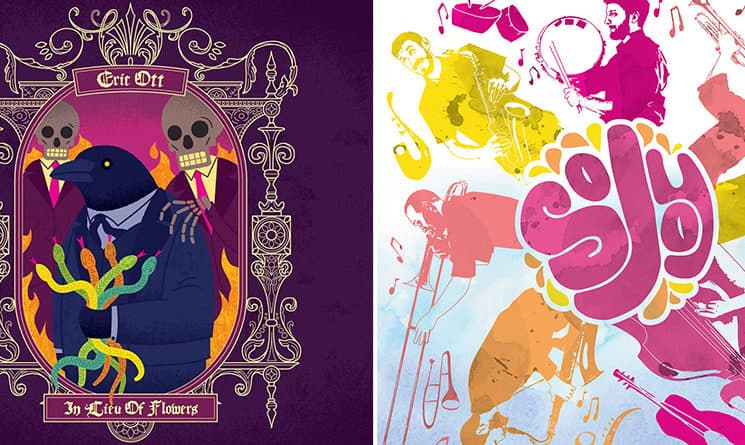Reviews of new Seacoast albums
by Andrew Wallace
“In Lieu of Flowers” by Eric Ott
75 or Less Records
File Under: indie, Americana, rock
Sounds like: Wilco, Simon and Garfunkel, Yo La Tengo
“Death was still such an abstract concept growing up.” “There’s a room that I go to in my mind when I want to think about death.” “It’s something that’s going to affect all of us.” These overlapping, meditative voice-overs guide the journey throughout Eric Ott’s death-inspired concept album, “In Lieu of Flowers.” What began as an RPM Challenge record in 2008 evolved into a vehicle for Ott to grapple with loss. Just like the stages of grief, his opus switches paces, styles, and perspectives often. To achieve his ambitious production goals, the award-winning songwriter enlisted the help of co-producer, engineer, and long-time collaborator Sean Yadisernia, as well as a bevy of musicians and friends including Dan McGary, Nate Laban, Chris Decato, and Mark Edgerly. The resulting ruminations about depression and the end of life turn in enjoyably surprising directions.
For “In Lieu of Flowers,” Ott tapped into new sonic inspiration, a longer list of collaborators, and an even bigger sound. Here, tackling the abstract concept of death and its effects on the living plays out in a number of successful stylistic and emotive choices, including his bread-and-butter Americana, indie rock, and even stadium pop and country. The production quality and magnitude of the diverse instrumentation, perhaps most notably Decato’s keyboards and the 10 contributing guitarists, are immediately noticeable. And yet, some of the biggest differences from Ott’s previous material are much more subtle.
Ott and guests slyly combine the earnest subject matter with playful musical or lyrical twists. On the opener, “Little Wars,” Ott tells a woeful tale of cancer and suicide, yet the catchy vocal melody — think They Might Be Giants meets Simon and Garfunkel — belies the morose message without making it a punchline. The song’s horn melodies could be interpreted as joyful or wailing. On “In Lieu,” that duality is a common theme that showcases a depth that can be difficult to achieve on concept records. Conversely, the stadium-pop anomaly, “Pop Starlet,” is full of triumphant hooks, keyboards, and guitar solos, while the lyrics reveal a cynical commentary about the hollow, even damaging love of celebrity and popular culture. It’s as infectious and powerful a song as an “Aladdin Sane”-era Bowie could have conceived, and one of the Seacoast’s best this year.
On “Old” and “Felt” we find Ott’s Americana sound with added hints of country twang and bended notes. Album highlights “If You Were Thinking” and the rocker “Under the Bed” merge Ott’s best anthemic melodies with his one of a kind songwriting and wit. “In Lieu of Flowers” is a diverse collection of expertly produced and compelling introspections that challenge us to listen, both as the living looking forward and as the dying looking back. It’s an outstanding record and a fitting one to round out one of the Seacoast’s finest, most productive years in recent memory.
“Sojoy” by Sojoy
Self-released
File Under: big band, modern jazz, hard bop, funk
Sounds like: Charles Mingus, Dizzy Gillespie, Lee Morgan
The symbiotic relationship between jazz musicians and visual artists has spawned some of the best-known art of the last century. The intersection of the aural and the visual is at the heart of Sojoy, an exultant septet built from the core of the Seacoast jazz, funk, and soul community. The project is the compositional outlet for drummer Jonny Peiffer, best known as the founder of the Afro-beat orchestra Shango and for his scores for a variety of theatrical productions from the Seacoast to New York City. Together with an amalgam of players from Shango, The Soggy Po’ Boys and Mother Superior and the Sliding Royales — Zach Lange, Claude Fried, Matt Langley, Eric Klaxton, Nick Mainella, and Scott Kiefner — they inspire and explore the visual arts with the In Ears ‘N’ Eyes artist collective during their own shows and on their vibrant first album.
Musically, Sojoy is an alluring junction where big-band rhythms meet hard-bop mid-century jazz, funky flourishes, and experimental contemporary compositions. Reminiscent of the strong melodic riffs and choruses of big bands, Peiffer employs a slower swing as a palette for his writing and improvisations. With the best horn section in the state, their bluesy, often whimsical solos recall the hard-bop era with memorable and thankfully reproducible lines. Yet “Sojoy” isn’t repetitive — they’re constantly forging unexpected ground while never staying grounded. On an album scored for reverie, every note is a new experiential direction, and they make it abundantly clear why jazz and the visual arts have always worked so well together.
On the opener, aptly named “Eros,” the horns swell in waves of anticipation under frisky solos on a journey that perhaps mimics a couple’s frantic first touch (and maybe even a small quarrel, or both, depending on where the jaunt takes them). On “Jimmy,” we get our first taste of the talents of bassist Kiefner who channels Mingus’ “So Long Eric” as he invites Lange for a ripping trumpet solo and Mainella for a smooth, even sultry, alto sax lead. On the hip-hop laden “Funkenwaltzen,” Langley’s renowned sax improvisations set the tune ablaze. “Starlings I,” a meditation on the bird’s fascinating migrations, builds to a crescendo before giving way to “Starlings II,” which at only three minutes long echoes the time constraints of 7-inch records. Here again, trumpeter Lange shines, channeling Lee Morgan in his brilliant embellishments. On their exceptional debut, Sojoy brings Peiffer’s visions to life and inspires our own, whether we paint them, dance them, or dream them.

